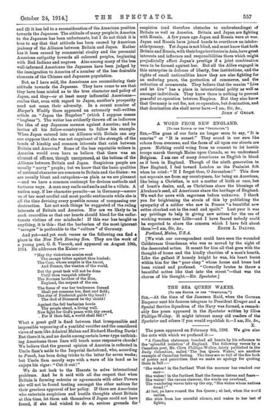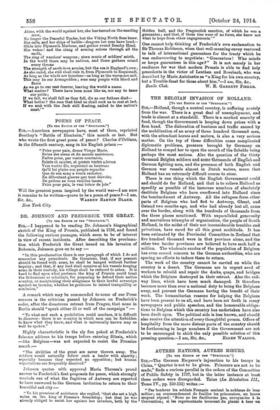THE SEA QUEEN WAKES. [To VII EDITOR or TR' "SPICTATOR..1
SIR,—At the time of the Jameson Raid, when the German Emperor sent his famous telegram to President Kruger and a Special Service Squadron of the Navy was formed, a remark- ably fine poem appeared in the Spectator written by Clive Phillips-Wolley. It might interest many old readers of the Spectator and others if you would republish it.—I am, Sir, &c.,
The poem appeared on February 8th, 1896. We give also the note with which we prefaced it :—
"A Canadian statesman touched all hearts by his reference to the 'splendid isolation' of England. The following verses by a Canadian poet, Mr. Clive Phillips-Wolley, lately published in the Daily Columbian, called The Sea Queen Wakes,' are another example of Canadian feeling. The lines are so full of the fire both of poetry and patriotism that we make no apology for quoting them in full:— 'She wakes ! in the furthest West the murmur has reached our ears— She wakes ! in the furthest East the foeman listens and fears— She wakes ! the ravens clamour, the winds cry overhead, The wandering waves take up the cry, "She wakes whom nations
dread !"
At last, ye have roused the Sea Queen ; at last, when the wor'd unites,
She stirs from her scornful silence, and wakes to her last of fights; Alone, with the world against her, she has turned on the snarling crew,
No longer the Peaceful Trader, but the Viking North Seas knew. She calls, and her ships of battle—dragons her seas have bred— Glide into Plymouth Harbour, and gather round Beachy Head. She wakes ! and the clang of arming echoes through all the earth, The ring of warriors' weapons ; stern music of soldiers' mirth. In the world there may be nations, and there gathers round every throne
The strength of earth-born armies, but the sea is England's own; As she ruled, she still shall rule it, from Plymouth to Esquimalt, As long as the winds are tameless—as long as the waves are salt. This may be our Armageddon ; seas may purple with blood and
flame As we go to our rest forever, leaving the world a name.
What matter? There have been none like ns, nor any to tame our pride; If we fall, we shall fall as they fell, die as our fathers died— What better the seas that bred us shall rock us to rest at last, If we sink with the Jack still floating, nailed to the nation's
mast.' "



































 Previous page
Previous page